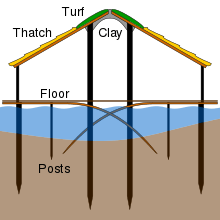Must Farm Bronze Age settlement
.jpg) | |
| Location | Whittlesey, Cambridgeshire, England |
|---|---|
| Coordinates | 52°33′43″N 0°11′02″W / 52.562°N 0.184°WCoordinates: 52°33′43″N 0°11′02″W / 52.562°N 0.184°W |
| History | |
| Material | Wood |
| Periods | Bronze Age |
| Site notes | |
| Archaeologists | Cambridge Archaeological Unit |
| Public access | No |
| Website |
www |
Part of a Bronze Age settlement was uncovered at Must Farm quarry, at Whittlesey, near Peterborough, in Cambridgeshire, England. The site has been described as "Britain's Pompeii" due to its relatively good condition, including the "best-preserved Bronze Age dwellings ever found" there.[1] The site is on a former river, inside Flag Fen basin,[2] around 2 kilometres (1.2 mi) south of Flag Fen itself. Must Farm was named Best archaeological project and Best archaeological discovery[3] at the 2012 British Archaeological Awards, and Best Discovery at the 2016 Awards.[4]
Early excavations
Wooden posts were first recognised there in 1999, leading to preliminary excavations in 2004 and 2006.[5] Early finds at the site include a rapier and a sword in 1969. Between 2011 and 2012, eight Bronze Age log boats were discovered.[2] The boats were found in a small freshwater palaeochannel and were preserved due to waterlogging.[6] Radiocarbon dating has indicated that the ages of these boats spanned a period of about 1,000 years, with the earliest examples dating to around 1750–1650 BCE.[7] Some of the boats may have been deliberately sunk.[8] They are now preserved at Flag Fen and are available to view on guided tours.[9]
Bronze Age woven wooden fish traps and wattle-hurdle fish weirs were found in the same channel, together with metalwork including swords and spears.[6]
2015/2016 excavation


In September 2015,[6] the University of Cambridge's Cambridge Archaeological Unit began a dig, eventually covering 1,100 square metres (1,300 sq yd),[2] the details of which were publicly disclosed in January 2016. Historic England have funded a £1.1 million project to excavate the site to gain as much knowledge of Bronze Age life in Britain as possible.[1] Archaeologists found two circular wooden houses, from about 1000–800 BCE, and concluded that they were damaged by fire and that the platform on which they sat then slid into the river, where the fire was extinguished and the buildings and objects within them were preserved in the silt.[1][2][12] About half of the settlement is thought to have been lost due to modern-day quarrying.[5]
Objects recovered include pots still containing food, textiles woven from lime tree bark and other plant fibres, sections of wattle walls, and glass beads.[1]
In 2016, a large wooden wheel of about 1 m (3.3 ft) in diameter was uncovered at the site. The specimen, dating from 1,100–800 years BCE, represents the most complete and earliest of its type found in Britain. The wheel's hub is also present. A horse's spine found nearby suggests the wheel may have been part of a horse-drawn cart. The find "expands our understanding of late Bronze Age technology", said Duncan Wilson, chief executive of Historic England, which is co-funding the project. The team have until July 2016 to excavate the site before the quarry owners require the land back.[13]
References
- 1 2 3 4 "Bronze Age houses uncovered in Cambridgeshire are Britain's 'Pompeii'". BBC Online. 12 January 2016. Retrieved 12 January 2016.
- 1 2 3 4 "Bronze Age Homes Unearthed in East Anglia". Historic England. 12 January 2016. Retrieved 12 January 2016.
- ↑ "British Archaeological Awards 2012". Council for British Archaeology. 9 July 2012. Retrieved 14 July 2016.
- ↑ "'Britain's Pompeii' was 'Bronze Age new build' site". BBC News. 14 July 2016. Retrieved 14 July 2016.
- 1 2 "About". mustfarm.com. Retrieved 12 January 2016.
- 1 2 3 "Must Farm". Retrieved 12 January 2016.
- ↑ "BBC News Cambridgeshire Flag Fen Bronze Age boats older than was first thought". 8 September 2013. Retrieved 8 September 2013.
- ↑ Kennedy, Maev (4 June 2013). "News Science Archaeology Eight bronze age boats surface at Fens creek in record find". The Guardian. London. Retrieved 5 June 2013.
- ↑ "Discover the Must Farm boats at Vivacity". Retrieved 13 January 2016.
- ↑ "Site Diary 21: A Tour of the Excavation: Part One". Must Farm. Retrieved 25 August 2016.
- ↑ "Latest archaeological finds at Must Farm provide a vivid picture of everyday life in the Bronze Age". Retrieved 17 August 2016.
- ↑ Must Farm Project [MustFarm] (13 January 2016). "...we have two buildings so far..." (Tweet). Retrieved 13 January 2016 – via Twitter.
- ↑ "Bronze Age wheel at 'British Pompeii' Must Farm an 'unprecedented find'". BBC News. UK: BBC. Retrieved 2016-02-18.
External links
| Wikimedia Commons has media related to Must Farm Bronze Age settlement. |
- Official website
- Podcast about the site by Dan Snow (MP3, 4m 31s, 6.3Mb)
- Frequently updated Twitter feed
- British Broadcasting Corporation: Britain's Pompei: A Village Lost in Time
.jpg)